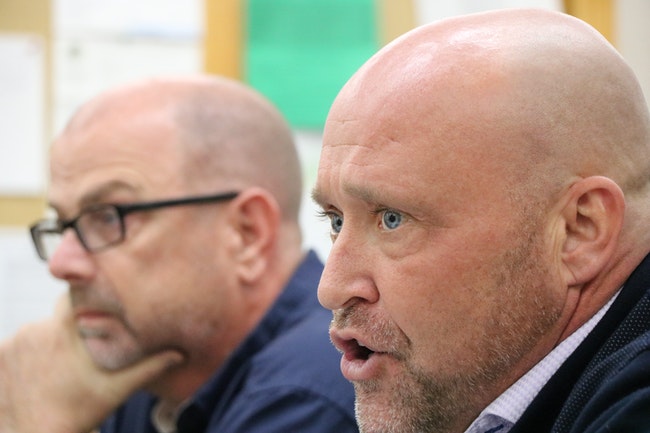 Greg Smith, Malheur County’s economic development director, talks to county commissioners at the Malheur County Courthouse on Wednesday, Dec. 11. Beside him is his assistant, John Braese. (The Enterprise/Joe Siess)
Greg Smith, Malheur County’s economic development director, talks to county commissioners at the Malheur County Courthouse on Wednesday, Dec. 11. Beside him is his assistant, John Braese. (The Enterprise/Joe Siess)
VALE – For the first time last week, top county leaders explained why they endorsed a plan to use taxpayer funds to buy a piece of real estate north of Nyssa to make way for new industrial development.
The Malheur County Court’s session on Dec. 11 attracted a large crowd that listened to Greg Smith, county economic development director, give county Judge Dan Joyce and County Commissioners Don Hodge and Larry Wilson an update on efforts to turn farm land into an industrial complex anchored by the Treasure Valley Reload Center.
The Malheur Enterprise also live streamed the meeting over Facebook, a video which has since been viewed more than 14,000 times.
The land for the reload center – north of downtown Nyssa – and an adjacent business park took center stage earlier this month after an independent appraisal showed the county intended to pay more than $3 million for property valued at $2 million.
State records obtained by the Enterprise show the county will dip into its reservoir of taxpayer dollars for nearly $1 million to close the deal on the property. Officials plan to take the $1 million from the county’s contingency fund, according to state records, which would cut in half what serves as the rainy-day account for emergencies and unexpected costs.
The county also received a state loan of up to $2.4 million to help buy the land and has applied for a second state-funded economic development program that would use future income tax payments to reimburse county costs for developing the projects. Hodge noted that if development goes as planned, the county would get back any money it put into the land.
“We will be whole,” Hodge said.
Repeated questions by the Enterprise to the court and to Smith to explain the real estate plan have been ignored but at the Wednesday session the motif of “build and they will come” took center stage. The court and Smith indicated that the taxpayer-funded land purchase is about investing in the future.
“Public sector investment leads to private sector investment,” Smith said.
Smith noted that the land has “zero utilities, zero roads, zero rail spurs.” The state has agreed to fund some of that cost, but Smith didn’t address how the county would pay for the rest.
After his presentation to the court, Smith answered questions from the audience but sidestepped the appraisal issue on the land commonly referred to as the Farmer property, a 290-acre parcel valued by an appraiser at $2.050 million, where the rail center and business park are planned. The county already agreed to pay $3.019 for the parcel but Smith said that land’s value will climb in the future.
Smith at the meeting and in an earlier interview explained the appraisal was low.
“There’s not a lot of comparable land in Oregon that they could get their values from. We said, ‘Okay,’” Smith said.
He told the Enterprise that commercial lenders and others have said the Nyssa ground was worth more. And he said the appraiser also told him how the farmland could be valued higher than the appraisal.
“The very first thing the appraiser said is if you could break this property up into smaller sections, there is no doubt in our minds that you’ll get the value that you need,” Smith said.
Lesley Miller of Agri-Access, who did the appraisal, said she couldn’t comment directly on Smith’s statements but that she was reaching out to him because there were “some corrections to be made.”
Smith didn’t respond to an email seeking comment on the matter.
In the meeting, however, Smith portrayed the bare land as an opportunity for the county.
“As we begin to make investments, the value of the land will increase significantly,” he said.
He suggested the county would profit even if it sells the land in the future at a discount. He said industrial buyers would readily pay $12,000 for developed property that was worth $20,000.
[ KEEP YOUR LOCAL NEWS STRONG – SUBSCRIBE ]
The land now is not developed and is mostly zoned industrial, though about 80 acres is reserved for farm use.
Smith said the county can repay the $2.4 million state loan a number of ways.
He said a lease agreement between the county and an independent firm to operate the rail reload facility could provide cash to help pay down the state loan.
He also touted leases or sale of property at the center and its adjacent business park as methods to pay down any county debt connected to the center.
Smith said, though, that the ability to upgrade the property will be key.
“The county can put the real estate up for sale with the improvements made at a significantly high price,” said Smith.
Vale resident Kathy Clarich asked Smith whether or not the real estate issue was land speculation.
“Why is the county getting into speculation?” asked Clarich.
Smith did not answer Clarich specifically but said the improvements to the land will increase its value.
“When the improvements are made that real estate is very different than the real estate of today. We’ll now have something to market,” said Smith.
Smith said outside firms are already interested in the business park at the reload facility.
“We’ve received multiple inquiries from folks,” he said. “We just received in the last three weeks another agriculture company looking for distribution for their product.”
Clarich wondered if taxpayers would ultimately have to pay for the facility.
Smith answered by describing the Port of Morrow in Morrow County.
“They are successful because of public sector investment,” said Smith.
The Port of Morrow has experienced steady growth since the mid-1980s and hosts a number of shipping, food processing and agriculture firms and is the second largest port in the state.
Smith also said it was important to remember that while the county will commit nearly $1 million to the project, it is going to receive $26 million from the state for the center.
“What we are trying to do is make these initial investments now,” said Smith.
Clarich said there was “no guarantee” the facility would attract businesses once it is built.
Wilson said that several feasibility studies indicated the facility will work.
“We could show that they deemed that it is successful,” said Wilson.
Clarich said the county will still “have to borrow money.”
Smith said the county, through the state-funded economic development program that furnishes income tax reimbursement for business, will “recoup its expenses.”
Smith said ongoing negotiations with Americold, a national transportation and warehousing firm to operate the reload center could help local onion producers find new customers. He said the project could “open new markets that otherwise weren’t even thought about 24 months ago.”
Joyce said the reload center’s economic impact “will end up benefitting the whole Treasure Valley.”
The reload center plan, crafted nearly two years ago, faced a number of hurdles during the past 18 months including intense scrutiny from the state and shifting start-up dates.
The state approved the facility last summer and agreed to release the first piece of the $26 million.
 Don Hodge, Malheur County commissioner, speaks at the Malheur County Courthouse during last week’s court meeting. (The Enterprise/Joe Siess)
Don Hodge, Malheur County commissioner, speaks at the Malheur County Courthouse during last week’s court meeting. (The Enterprise/Joe Siess)
 Larry Wilson, Malheur County Commissioner, at the courthouse on Wednesday, Dec. 11. (The Enterprise/Joe Siess)
Larry Wilson, Malheur County Commissioner, at the courthouse on Wednesday, Dec. 11. (The Enterprise/Joe Siess)
Reporter Pat Caldwell: [email protected] or 541-473-3377.
For the latest news, follow the Enterprise on Facebook and Twitter.
SUBSCRIBE TO HELP PRODUCE VITAL REPORTING — For $5 a month, you get breaking news alerts, emailed newsletters and around-the-clock access to our stories. We depend on subscribers to pay for in-depth, accurate news produced by a professional and highly trained staff. Help us grow and get better with your subscription. Sign up HERE.




